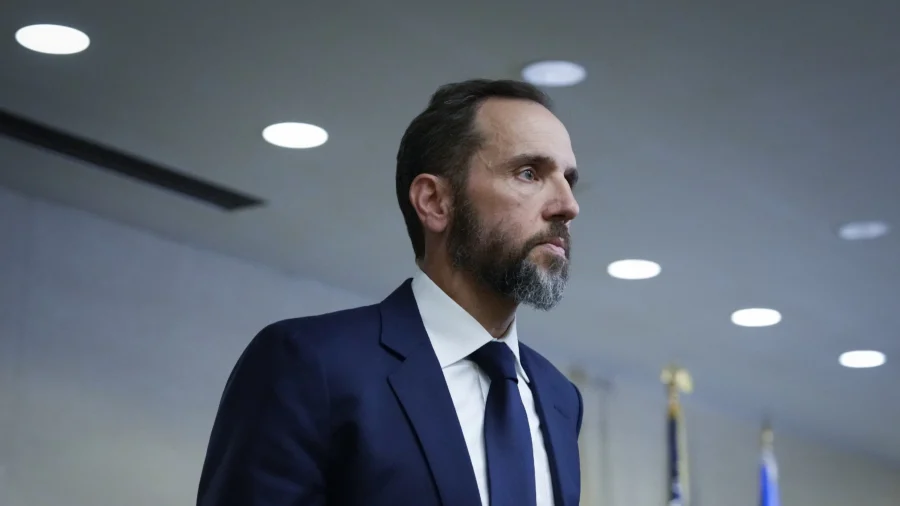Special counsel Jack Smith on March 29 asked a federal judge to approve redactions to filings made by a co-defendant of former President Donald Trump.
The briefs submitted by Walt Nauta, the co-defendant, contain information that should not be made public, Mr. Smith told U.S. District Judge Aileen Cannon.
That includes the names of people that government officials may call as witnesses in a trial, the special counsel, appointed by Attorney General Merrick Garland, said.
“Witness safety and privacy are paramount pretrial. The limited redactions of the names satisfy the good cause standard established in Chicago Tribune Co. v. Bridgestone/Firestone, Inc., as well as the higher standard requiring a compelling interest for the redactions and the redactions being narrowly tailored,” Mr. Smith said in his request.
The Chicago Tribune case, decided in 2001 by the U.S. Court of Appeals for the Eleventh Circuit, hinged on a federal rule that enables keeping information secret if there is “good cause” to do so.
“Federal courts have superimposed a balancing of interests approach for Rule 26’s good cause requirement,” that ruling stated. “This standard requires the district court to balance the party’s interest in obtaining access against the other party’s interest in keeping the information confidential.”
Mr. Smith also wants redacted, in addition to the names of potential government witnesses, “any pronouns revealing their gender,” according to the new filing.
And the special counsel is asking that information about sealed grand jury proceedings be kept secret, including one proceeding that happened before he was appointed.
The proposed redactions come after Judge Cannon, who was appointed by President Trump, outlined a schedule for the parties in the case with respect to redactions.
The proposals are for two filings from Mr. Nauta—a reply to the government on his assertion that the prosecution of him has been selective and vindictive, and a motion to suppress evidence.
Other recent documents from Mr. Nauta and President Trump that have not been placed on the public docket do not require redactions, Mr. Smith said. Those documents include President Trump’s briefs in support of a motion to dismiss the charges based on prosecutorial misconduct and selective and vindictive prosecution.
The actual motions to dismiss based on selective and vindictive prosecution have still not been made available to the public, although Mr. Smith’s team described some of its contents in another recent filing.
Prosecutors said that Mr. Nauta in his motion focused on a conversation that his attorney had over coffee with one of the prosecutors. During that discussion, the prosecutor was quoted as saying the government would not “accept anything less than Mr. Nauta’s full cooperation” in exchange for not being charged.
Prosecutors say the decision to charge Mr. Nauta after he declined to cooperate does not “amount to vindictiveness as a matter of law.”
In a related filing, Mr. Nauta said the government was focused only on himself and another former aide of President Trump while ignoring a “universe of other comparators who, unlike Mr. Nauta, were likewise never prosecuted.”
“Instead of naming anyone else in that ‘universe,’ Nauta resorted to his adoption of defendant Trump’s motion to dismiss for selective and vindictive prosecution, and attempted to rely on the comparators that Trump named in his motion, in an apparent effort to argue—for the first time—that President Biden’s staff members are similarly-situated comparators as to him,” the special counsel said. “We say ‘apparent’ only because Nauta provided no elaboration on his theory beyond mentioning these individuals and conclusorily dubbing them ‘similarly situated.’”
Special counsel Robert Hur recently reported that some of President Biden’s staff members were “unable to account for all the classified material Mr. Biden received and retained,” although there were no signs President Biden, as President Trump is accused of doing, ordered staff to move boxes of classified materials, according to Mr. Hur.
President Trump, Mr. Nauta, and Carlos de Oliveira have been charged with retaining sensitive documents and keeping them from authorities.
Mr. Hur, also appointed by Mr. Garland, found that President Biden intentionally kept classified materials after he exited the vice presidency but declined to recommend charges because “it would be difficult to convince a jury that they should convict him—by then a former president well into his eighties—of a serious felony that requires a mental state of willfulness.”
From The Epoch Times

